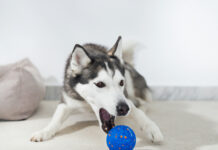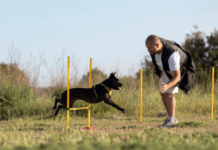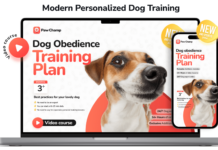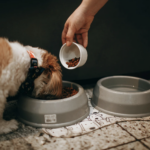Last Updated on March 15, 2024 by Dogs Vets
Bringing a new puppy into your home is an exciting and rewarding experience. However, it also comes with its own set of challenges, especially when it comes to training.
Establishing a strong foundation for obedience and behavior early on is crucial for ensuring a happy and well-adjusted canine companion.
Here are some essential training tips for new puppy owners to help you navigate this important phase of your pet’s development.
Start Early: Establish Consistent Routines
Consistency is key when it comes to training a puppy. Start implementing routines for feeding, bathroom breaks, playtime, and training sessions from day one. Dogs thrive on predictability, and a consistent schedule will help your puppy learn what is expected of them and when.
Leash Training: Teach Loose Leash Walking
“Proper leash training is essential for both your puppy’s safety and your enjoyment of walks together. Start by getting your puppy used to wearing a collar or harness and gradually introduce them to walking on a leash,” says Rachael Tricarico of Houndztooth. “Encourage them to walk beside you using treats and praise, and gently correct any pulling or lunging behavior.
Consistency and patience are key, and remember to keep training sessions short and positive.”
Basic Commands: Focus on Fundamentals
Teaching your puppy basic commands such as sit, stay, come, and down lays the foundation for obedience and good manners.
Use positive reinforcement techniques such as treats, praise, and toys to reward your puppy for obeying commands. Keep training sessions short, fun, and frequent, and be patient as your puppy learns and grows.
Manage Behavior: Set Clear Boundaries
Establishing clear boundaries and rules from the beginning will help prevent unwanted behaviors and ensure a harmonious relationship with your puppy. Consistently reinforce desired behaviors and redirect or ignore unwanted behaviors without resorting to punishment.
Remember that puppies are still learning and exploring the world around them, so be patient and consistent in your training approach.
Exercise: Keep Your Puppy Active and Engaged
“Regular exercise is important for keeping your puppy physically and mentally stimulated. Provide opportunities for playtime, walks, and interactive games to help burn off excess energy and prevent boredom,” says Sai Blackbyrn of Coach Foundation. “Engage in activities that cater to your puppy’s natural instincts, such as fetching, tug-of-war, or puzzle toys that dispense treats.
A tired puppy is less likely to engage in destructive behaviors and more likely to be receptive to training.”
Crate Training: Create a Safe and Comfortable Space
Crate training can be a valuable tool for managing your puppy’s behavior and providing them with a safe and comfortable space of their own.
Introduce your puppy to their crate gradually, using positive reinforcement techniques such as treats and praise to create positive associations. Use the crate for short periods initially, gradually increasing the duration as your puppy becomes more comfortable.
Avoid using the crate as a form of punishment, and never leave your puppy crated for extended periods without breaks for bathroom breaks, exercise, and socialization.
Consistency is Key: Stick to Your Training Plan
Consistency is essential for successful puppy training. Stick to your training plan and be consistent in your expectations, commands, and rewards. Everyone in the household should be on the same page when it comes to training and enforcing rules.
Avoid sending mixed messages to your puppy, as this can lead to confusion and frustration. Consistent and clear communication will help your puppy understand what is expected of them and reinforce desired behaviors.
Patience and Persistence: Embrace the Learning Process
“Training a puppy is a journey filled with ups and downs, successes and setbacks. It’s essential to approach training with patience, understanding that puppies are still learning and developing.
Celebrate small victories and progress, and don’t be discouraged by setbacks,” says Ava Flores of Flawless Intuition. “Remember that consistency, positive reinforcement, and perseverance are key ingredients for success.
With time, patience, and persistence, you’ll see the fruits of your efforts as your puppy grows into a well-behaved and well-adjusted adult dog.”
Bonding Time: Build a Strong Relationship with Your Puppy
Training provides an excellent opportunity to strengthen the bond between you and your puppy. Spend quality time together during training sessions, playtime, and everyday interactions. Use training as a way to build trust, communication, and mutual respect.
Positive reinforcement techniques such as treats, praise, and affection will help create a positive association with you as their owner and trainer. Enjoy the process of getting to know your puppy and building a lifelong partnership based on love, trust, and understanding.
Seek Professional Help When Needed
If you’re struggling with training or behavior issues, don’t hesitate to seek help from a professional dog trainer or behaviorist. They can provide personalized guidance and support tailored to your puppy’s specific needs and temperament.
Investing in professional training early on can save you time, frustration, and potential problems down the road.
Incorporate Enrichment Activities: Stimulate Your Puppy’s Mind
In addition to physical exercise, “it’s essential to engage your puppy’s mind with enrichment activities.
These activities provide mental stimulation and help prevent boredom and destructive behaviors,” says Peter Brooke of HealthPlusLife. “Consider introducing puzzle toys, interactive feeders, and scent games to challenge your puppy’s problem-solving skills and keep them entertained.
You can also rotate toys regularly to keep things fresh and exciting for your curious canine companion.”
Explore Different Training Methods: Find What Works Best for Your Puppy
Every puppy is unique, and what works for one may not work for another. Explore different training methods and techniques to find what resonates best with your puppy’s personality and learning style.
Some puppies may respond well to clicker training, while others may prefer lure and reward methods. Be flexible and adaptable in your approach, and don’t be afraid to try new things until you find what works best for you and your puppy.
Housebreaking: Patience and Positive Reinforcement
Housebreaking is one of the first and most important training tasks for new puppy owners. Set your puppy up for success by taking them outside frequently, especially after meals, naps, and playtime.
When they eliminate outdoors, praise and reward them with treats or verbal praise. Accidents indoors are inevitable, so be patient and avoid punishment, as it can confuse and frighten your puppy.
Use Verbal and Non-Verbal Communication: Enhance Your Connection
“Communication is key to successful training and building a strong bond with your puppy. Use a combination of verbal cues, hand signals, and body language to convey your expectations and intentions clearly.
Consistent use of cues and signals will help your puppy understand what you’re asking of them and strengthen your communication bond,” says Kimo Rawlins of The Marine King.
“Pay attention to your puppy’s body language and responses, and adjust your training approach accordingly to ensure clarity and understanding.”
Incorporate Real-Life Scenarios: Practice Training in Different Environments
Generalizing training to various environments and real-life scenarios is essential for ensuring your puppy’s obedience and behavior are reliable in any situation.
Practice obedience commands and manners in different locations, both indoors and outdoors, to help your puppy generalize their training skills.
Start in low-distraction environments and gradually increase the level of difficulty as your puppy becomes more proficient. Exposing your puppy to different stimuli and situations early on will help them become well-rounded and adaptable adult dogs.
Don’t Forget to Have Fun: Enjoy the Journey Together
“Remember to have fun and enjoy the journey of raising a puppy. Embrace the playful moments, celebrate your puppy’s progress, and cherish the special bond you share.
Incorporate games, tricks, and activities that both you and your puppy enjoy to make training sessions enjoyable and rewarding for both of you,” says Paul Cannon of Cannon Creek.
“A positive and lighthearted approach to training will strengthen your bond and make the experience more fulfilling for you and your furry friend.”
Socialization: Expose Your Puppy to New Experiences
Early socialization is crucial for helping your puppy grow into a well-adjusted and confident adult dog. Introduce them to a variety of people, animals, sounds, and environments in a positive and controlled manner.
Puppy socialization classes can be a great way to safely expose your puppy to new experiences and help them develop good social skills.
Conclusion
Training a new puppy is a rewarding and enriching experience that requires patience, dedication, and creativity.
By incorporating enrichment activities, exploring different training methods, enhancing communication, practicing in real-life scenarios, and prioritizing fun, you can build a strong foundation for obedience and behavior while strengthening your bond with your puppy.
Remember that every puppy is unique, so be flexible, adaptable, and above all, enjoy the journey of learning and growing together with your canine companion.
Fact Check
We strive to provide the latest valuable information for pet lovers with accuracy and fairness. If you would like to add to this post or advertise with us, don’t hesitate to reach us. If you see something that doesn’t look right, contact us!

















